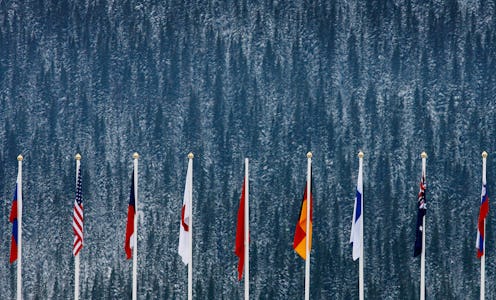News
Sweden's Groundbreaking Stance On Palestine
Hours after its new Prime Minister took office on Oct. 3, Sweden declared its recognition of the state of Palestine, becoming the first major EU country to do so. In his inaugural address to Sweden's parliament, Prime Minister Stefan Löfven said:
The conflict between Israel can only be solved with a two-state solution, negotiated in accordance with international law. It must guarantee the legitimate demands of both the Palestinians and the Israelis for national self-determination and security. A two-state solution requires mutual recognition and a will to peaceful co-existence.
Predictably, both Israel and the U.S. opposed the announcement. According to L.A. Times, Israeli Foreign Minister Avigdor Lieberman has summoned the Swedish Ambassador, presumably for reprimanding, and said of Löfven:
He apparently has not yet had sufficient time to study the matter and understand it is the Palestinians who have for the past 20 years been an obstacle to reaching an agreement.
The announcement is a big deal for Palestinians, not only because an EU nation has thrown its support behind two-state negotiations on equal footing, but also because of Sweden's clout in the union.
The strain on Sweden's welfare system caused by the huge influx of foreigners has brought about the recent alarming surge of support for the Sweden Democrats, a nationalist, anti-immigrant political group. It's clear, though, that through Sweden's recognition of a Palestine state, the new government intends to keep up its commitment to its long-standing humanitarian values.
In the aftermath of the Gaza war and the breakdown of the peace negotiations earlier this year, how does this declaration affect the peace process?
It legitimizes the Palestinians' struggle for statehood
Sweden is far from the first nation to recognize the state of Palestine; in fact, currently over 130 countries do. But as the first EU member to do so, and as a country known as a bastion for tolerance and cultural diversity (it has absorbed tens of thousands of Somalis, Palestinians and ex-Yugoslavians fleeing their war torn countries, and most recently, over 30,000 Syrian refugees), Sweden's announcement has given the Palestinians more legitimacy in the international community, and in extension, the peace process.
The BDS Movement may gain more traction
The move could pave the way for other governments to, if not recognize a state for the Palestinians, at least set the foundation for its support through Boycott, Divestment, and Sanctions Movement — radical, non-violent activism that aims to increase economic and political pressure on Israel to end its occupation of Palestinian land, grant full equality to Arab-Palestinian citizens of Israel, and allow Palestinian refugees their right of return.
Among others, the BDS Movement has been responsible for artists refusing to perform in Israel as a cultural boycott, and had significant impact on the profit margins of SodaStream, the company operating on the occupied West Bank that hired Scarlett Johansson as its brand ambassador to much controversy.
Sweden could lead the way for other countries to do the same
Sweden has a high moral standing in the international community, and this decision could pave the way for other European (and non-European) countries to do the same. The British parliament is set to vote on recognition of the state of Palestine later this month. Mounting international pressure could sway Israel back to the negotiating table, this time with the Palestinians as equals, and to keep its promise of halting settlements in the West Bank.
Sweden's move, while not too surprising, could set the precedent for other European governments to ride the wave of a change in sentiments in the Israeli-Palestinian conflict.
Images: Getty Images (3)
